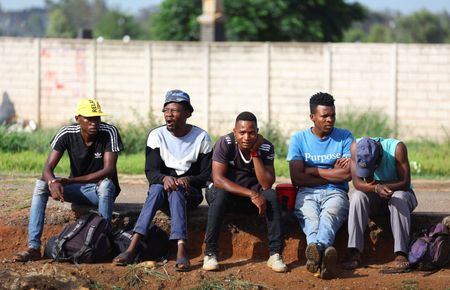CAIRO (Reuters) -Saudi Arabia has deposited $5 billion in Egypt’s central bank, the Saudi state news agency reported on Wednesday, and the kingdom is expected to invest further as the Ukraine war adds to the pressure on the Egyptian economy.
Last week Egypt said it was in talks with the International Monetary Fund for potential funds and technical support to hedge against the effects of the Russia-Ukraine crisis on its economy.
Funding from additional donors is often a condition for finance from the IMF.
“The Kingdom of Saudi Arabia, to implement the directives of the Custodian of the Two Holy Mosques King Salman bin Abdulaziz Al Saud and His Highness the Crown Prince, deposited five billion dollars with the Central Bank of Egypt,” the report from the state Saudi Press Agency said on Wednesday.
In addition, an Egyptian cabinet statement said on Wednesday Saudi Arabia’s state-owned Public Investment Fund (PIF) would invest additional funds in Egypt, but gave few details.
Cooperation between the PIF and Egypt’s sovereign fund will involve measures to attract $10 billion in investments, the cabinet statement quoted Egyptian Prime Minister Moustafa Madbouly as saying. A package of projects would be announced as soon as possible, he said.
It quoted Saudi Minister of State for Shura Council Affairs Essam bin Saeed as saying that a private investment company would be established in Egypt under an agreement signed with the Egyptians.
“The PIF has many opportunities and investments, whether through Egypt’s sovereign fund or in partnership with private companies, that it will present to the Egyptian government soon,” bin Saeed said.
They would include investments in sectors such as education, health, especially medicine, agriculture, development and finance.
The PIF investments would help attract foreign currencies, support the use of local labour, bring in modern technology and expertise and enhance trade between Egypt and Saudi Arabia, the Egyptian cabinet statement said.
Russia’s invasion of Ukraine at the end of February has had a global impact on markets.
For Egypt, the economic damage is particularly severe because Ukraine and Russia were its principal wheat suppliers and among its main sources of tourists.
On March 21, Egypt devalued its currency by around 14% after investors withdrew billions of dollars from Egyptian treasury markets.
Already in October, Saudi Arabia said it had deposited $3 billion with Egypt’s central bank and extended the term of another $2.3 bln in previous deposits. The deposit announced on Wednesday would bring the total to $10.3 billion.
As of Sept. 30, the United Arab Emirates had $5.7 billion in long-term deposits and Kuwait $4.0 billion with Egypt’s central bank, according to central bank data.
Egypt has reached agreement with Qatar on investment deals worth $5 billion, the Egyptian cabinet said in a statement on Tuesday.
(Reporting by Mahmoud Mourad and Momen Atallah; Writing by Nadine Awadalla and Patrick Werr; Editing by Andrew Heavens, Aidan Lewis and Barbara Lewis)










